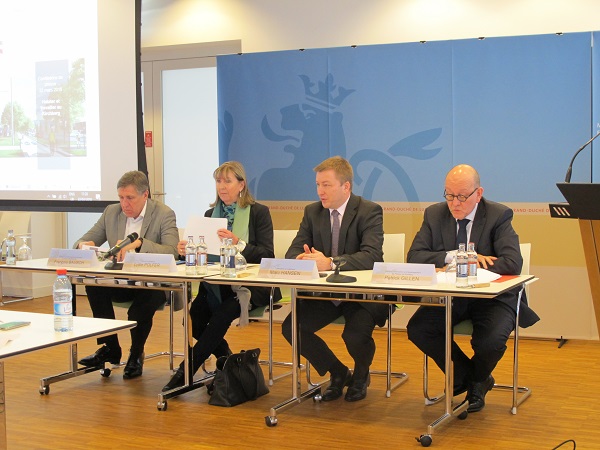 (L-R): François Bausch, Minister of Sustainable Development and Infrastructure; Lydie Polfer, Luxembourg city mayor; Marc Hansen, Minister of Housing; Patrick Gillen, President Fonds Kirchberg;
Credit: MDDI
(L-R): François Bausch, Minister of Sustainable Development and Infrastructure; Lydie Polfer, Luxembourg city mayor; Marc Hansen, Minister of Housing; Patrick Gillen, President Fonds Kirchberg;
Credit: MDDI
François Bausch, Luxembourg's Minister for Sustainable Development and Infrastructure, Marc Hansen, Minister of Housing, and Patrick Gillen, President of Fonds Kirchberg, in the presence of Lydie Polfer, Mayor of the City of Luxembourg, today presented details of the urban planning projects for Kirchberg.
In order to assume its responsibility for sustainable development, the Fonds Kirchberg, a public institution under the supervision of the Minister for Sustainable Development and Infrastructure, is advocating a new approach based on the principles of the circular economy with the aim of creating diverse neighbourhoods where life is good.
From zoning to an urban mix
The Fonds Kirchberg is now focusing on the construction of living quarters near workplaces and is encouraging the use of public transport. This is especially true since the installation of the tramway in Kirchberg. The Avenue John F. Kennedy has now almost two thirds of its width dedicated to public transport and soft mobility. This in a perspective to make the public space available to pedestrians with the creation of centralities on a human scale and a green frame inviting people to walk.
The Fonds Kirchberg is encouraging cycling with the installation of a network of cycle paths that crosses the entire Kirchberg plateau, thus seamlessly connecting Senningerberg to the center of the city of Luxembourg. For the comfort of pedestrians, additional lanes have been laid on Avenue J. F. Kennedy.
After the development of the "Op der Schleed" site, located on the northern part of the plateau between Boulevard Konrad Adenauer and Boulevard Pierre Frieden, which will welcome around 10,000 new inhabitants on 60 ha of land, the tramway will also serve this part of Kirchberg.
According to current estimates, the number of inhabitants in Kirchberg will increase from 3,600 to about 22,000 in the next 20 to 30 years. In the short and medium term, 820 new homes will be available in Kiem District, 480 in the East and West Reimerwee neighbourhoods.
An urban laboratory
New housing, alternative mobility and ecological performance concepts will be put into practice over the next few years in three pilot projects: Phase 1 of the JFK South project, the Kiem Phase 2 project and the Grünewald joint project. In a second stage will be the sites of phase 2 of the JFK South project, the former Eurocontrol, the Grünewald West and the Luxexpo site.
In the long term, the new principles of urbanisation and innovative spatial concepts will also be applied to part of the "op der Schleed" site, namely the future Kuebebierg district. It will host a large mix of housing, services and local amenities with, among others, primary and secondary schools and an urban farm.








